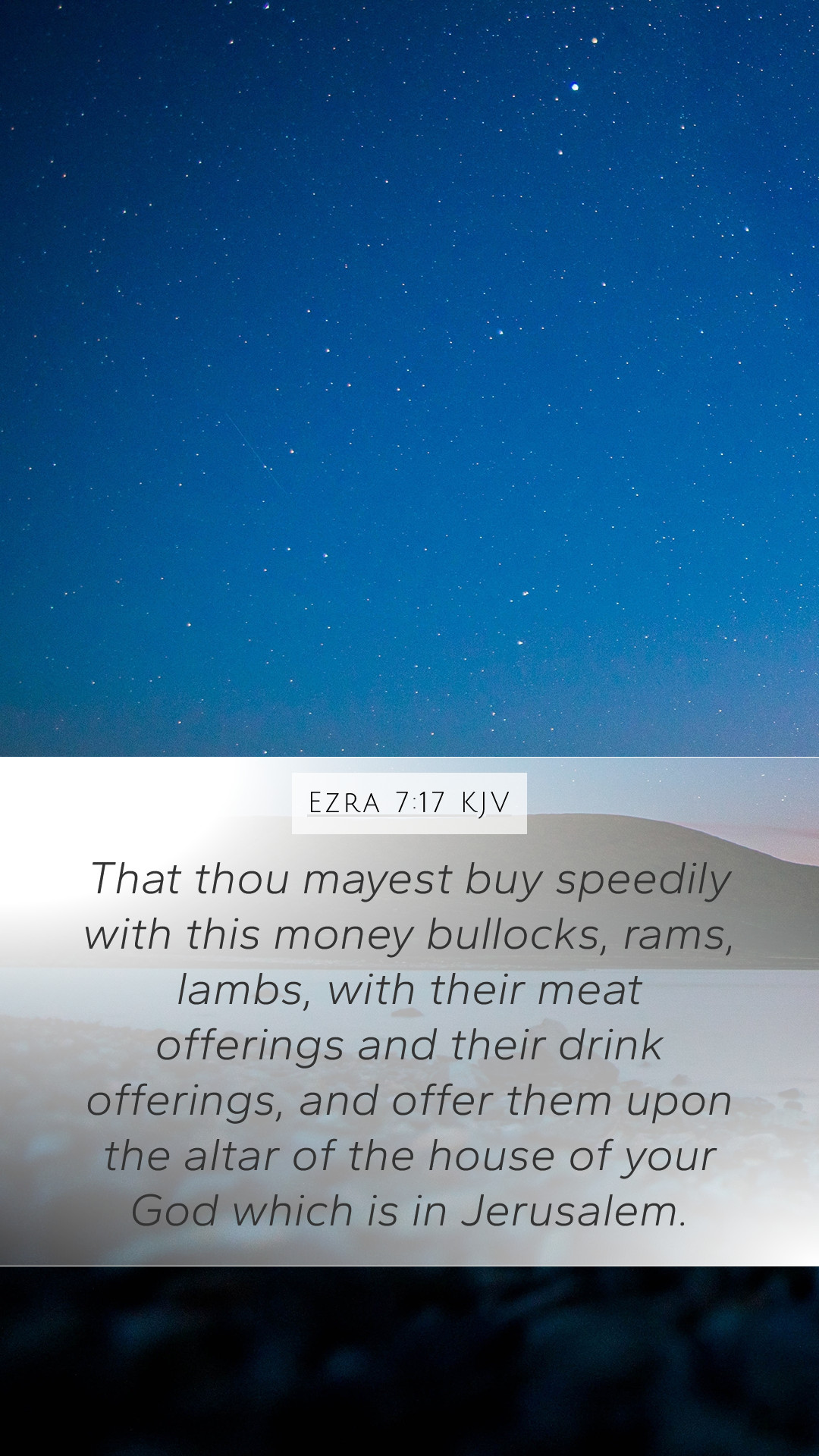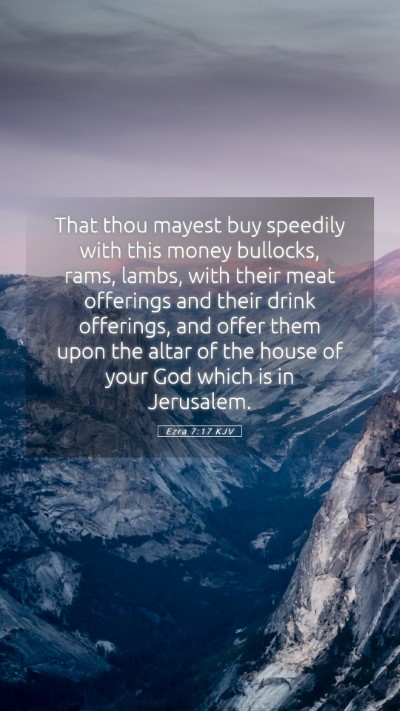Old Testament
Genesis Exodus Leviticus Numbers Deuteronomy Joshua Judges Ruth 1 Samuel 2 Samuel 1 Kings 2 Kings 1 Chronicles 2 Chronicles Ezra Nehemiah Esther Job Psalms Proverbs Ecclesiastes Song of Solomon Isaiah Jeremiah Lamentations Ezekiel Daniel Hosea Joel Amos Obadiah Jonah Micah Nahum Habakkuk Zephaniah Haggai Zechariah MalachiEzra 7:17 Meaning
What is the meaning of Ezra 7:17?
That thou mayest buy speedily with this money bullocks, rams, lambs, with their meat offerings and their drink offerings, and offer them upon the altar of the house of your God which is in Jerusalem.
Ezra 7:17 Bible Verse Meaning
Understanding Ezra 7:17
Ezra 7:17 states:
"And whatsoever shall seem good to thee, and to thy brethren, to do with the silver and the gold, that do after the will of your God." (Ezra 7:17, KJV)
This verse reflects a significant moment in the scriptural narrative, as Ezra, a scribe well-versed in the Law of Moses, conveys the authority granted to him to govern and make decisions regarding the offerings he received. The implications of this verse resonate through various aspects of biblical teaching and interpretation.
Bible Verse Meanings and Interpretations
In this verse, Ezra acknowledges the resources provided to him and gives his fellow brethren the freedom to use these resources as they see fit, emphasizing the principle of divinely inspired guidance in decision-making. Here are several insights drawn from public domain commentaries:
- Matthew Henry: Matthew Henry emphasizes that Ezra’s leadership involved not only spiritual elements but also practical administration of resources for the purpose of worship and community rebuilding. He notes that Ezra's faith in God’s provision manifested in his delegation of tasks and responsibilities.
- Albert Barnes: Barnes highlights the importance of stewardship, where Ezra calls upon the people to exercise wisdom and discernment in managing the funds for the Lord's service. This notion of having the will of God as a guiding principle is seen as paramount.
- Adam Clarke: Clarke elaborates on the context of the verse, mentioning that Ezra was granted authority by Artaxerxes, the Persian king. He discusses the interplay between secular authority and divine mission, underscoring that while Ezra had the king's endorsement, he remained committed to following God's will.
Key Themes and Insights
This verse introduces several key themes relevant to biblical study and understanding:
- The Role of Leadership: Ezra serves as a model of godly leadership, highlighting the importance of seeking divine guidance in administrative matters.
- Stewardship of Resources: The exhortation to do as "seems good" underscores a broader theme in Scripture regarding resource management under the guidance of divine principles.
- Divine Authority vs. Secular Authority: The balance between Ezra’s authorization from the king and his commitment to God’s law illustrates the nuanced relationship between earthly governments and divine governance.
Application and Significance
For contemporary readers and those involved in bible study groups, the application of Ezra 7:17 can inspire personal reflection on how to handle resources in ways that align with their faith. Furthermore, it encourages believers to:
- Engage in Prayerful Decision-Making: Just as Ezra sought God's guidance, believers should prioritize prayer when making significant life choices involving material resources.
- Promote Community Involvement: Encouraging collaborative decision-making among members of a community reflects the biblical principle of unity in purpose.
- Reflect on God’s Provision: Understanding that all resources belong to God cultivates a heart of gratitude and generosity in sharing what one has been given.
Historical Context
To fully appreciate the meaning of Ezra 7:17, it is vital to consider the historical context of the return of the exiles from Babylon. This period was marked by the rebuilding of the temple and the community of Israel, which underscores the importance of Ezra’s leadership in restoring not just walls, but the people’s spiritual integrity.
Cross References
Here are relevant cross-references that provide additional context and insights into Ezra 7:17:
- Nehemiah 2:8: Discusses the importance of resources for rebuilding, paralleling Ezra’s leadership and the call for community action.
- Isaiah 60:11: Expounds on the significance of offerings to support God’s work, resonating with the themes of stewardship found in Ezra.
- James 1:5: Offers a call for wisdom in decision-making, linking directly to the concept of seeking divine guidance.
Conclusion
In conclusion, Ezra 7:17 serves as a profound reminder of the importance of aligning decisions with God’s will, especially concerning resources dedicated to spiritual and community growth. Its applications extend beyond the historical context to inform our bible study resources and practices today, encouraging a thorough scripture analysis that fosters both individual and communal faith development.


